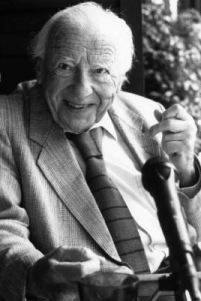Martin Heidegger: Helping Old Ladies Worship Jesus since 1927 AD

Mark 10:17 And as he was setting out on his journey, a man ran up and knelt before him (Jesus!) and asked him, "Good Teacher, what must I do to inherit eternal life?"
And Jesus said: "You must make a cognitive assent to something called substitutionary atonement so that you can sit and listen to 45 minute sermons about what is in the Greek and slowly gain more knowledge of Christian stuff."
And the man went away sad because it didn't make any sense to him.
Okay, so I am playing a little hard and fast here, but a question came to me earlier: "What it means to be a Chritian?" Take a moment and answer that for yourself. I have a certain answer but I am concerned that many evangelicals display or give off an entirely inappropriate one. For instance, does being a Christian ultimately mean gaining more theological knowledge or more exegetical skill in determing what the Bible says? Obviously not, for if this were so then the majority of the "Christians" in the world would be barely that. Then you have the problem of Christianity before the printing press, did God just let them off the hook? I don't think so.
The deeper issue though seems to be our attitude towards a certain type of knoweldge: that is knowledge of facts and assertions. Somehow or other the knoweldge of facts seems to have become the hallmark of certain parts of Christianity; you can't be a "good" Christian unless you know that you have imputed righteousness from the atonement applied by the Holy Spirit through various means except by your baptism. Confessionalism, which once was a way to mark boundries in churches, has become the hallmark of your relation to Christ; the more theological facts you know the better. But like the man in the story, to most of us this way of seeing the world doesn't make sense of how we live. Living is not about knowing facts, it is about being-in-the-world. And here is where Heidegger comes to the rescue of old ladies who go to church ever week without "knowing" what is going on in the Eucharist.
Heidegger sees a serious mistake in ontology which has been carried down through the history of philosohpy since Plato (!). I don't want to go in depth on this, if you are interested I encourage you to give Being and Time a go, it is well worth the effort! But back to Heidegger's thesis. He sees our metaphysics as something detached from life; we see objects and think about objects, and make theories about objects, all as subjects. Heidegger wants to scream Nein! to this whole notion of subject/object distinction because he says we are not beings seperate from the world, be are beings-in-the-world, or Dasein. He says that the way we normally see "knowledge" in this old framework is through objects being "present-at-hand", which to him is a derivative form of knowledge and existence. The more fundamental way of being in the world is involvement with the world as "ready-to-hand". When we are being fundamentally we are involved in the world, not speculating about it. This is the "everydayness" which Heidegger sees as most fundamental in ontology, whereas traditional ontology stepped past this mode of being to a detached and less "real" mode.
Okay, let's have an example or two just to get the feel of this. Take the case of writing a letter. There is a world of involvement in this little operation, but we will focus on the paper, the pen and the person (sounds like a Protestant sermon, eh?). Traditional metaphysics would want to break the whole situation down into its constituent parts, i.e. what the pen is doing, what the paper is doing, what the person is doing. We could then go deeper, say the person and look into their muscle interactions, then their neuro interactions, and then...well you get the picture. The problem is that in doing this "deconstruction" we have actually missed what is going on in the involvement whole of the activity. Heidegger says you can't break Dasein up like that becauce you can't seperate being from the world, hence the hypens in being-in-the-world. For instance, while you are writing it is absolutely imperitive that you have no "object" oriented knowledge of the pen at the moment. If you did recognize the pen as an object in this detached fashion you would not be able to write! The same goes for the paper and even the person. When something is happening (anything, even thinking?) there is a total involvement of the world which can not be seperated. It is in this case that Heidegger says object reflection is a second order form of knowledge.
Knowledge to Heidegger is more "knowing how" than "knowing what" about something. The second is derivative from the first, present-at-hand comes after a break down in ready-to-hand knowledge. Here is another example. I was practicing squash today, as I am wont to do sometimes, and I was trying to reflect on what I was doing. But when I tried to think about each shot and each motion, I was no longer able to play the game. In order to play squash I needed to be involved in the whole, not thinking in part. This goes for any sporting activity really, you can't think of every motion otherwise you won't be able to move! It is much like the story of the centipede being asked how it coordinates all its legs. When it tried to think about it it got all tangled up, but before being asked and having to reflect on it the centipede was happily able to walk along. In traditonal metaphysics this "non-reflective) stance has been called "unconsciousness", but not the negative attitude to it. It is not-conscious, and in that sense has the feeling of not being the right mode of being. Heidegger wants to turn this on its head by saying the involvement in the world pre-reflectively is the normal and primary mode of existence, reflection is always a secondary and detached way of existing.
So you are probably wondering how this all fits in with old ladies at church on Sunday? Well, the traditional evangelical understanding of the faith of these old ladies is that they are not as "good" at being Christian since they lack the requisite doctrinal or reflective knowledge of the faith. Most people will deny this implication, but I think they are just making excuses. You can find this out by asking if anything needs to be done for these old ladies as compared to me, the theological student. Evangelical answer: time for Alpha or Christianity Explored! But you can hopefully see that this understanding can be turned around by Heidegger's metaphysics since these old ladies do not have a deficient life in the faith; in fact they may be "more" Christian than many reflective evangelicals who do not attend church like the ladies. As a case in point, these old ladies do know a lot about the Christian faith; it is just a involvement and ready-to-hand form of the knowledge, which Heidegger says is the primordial form of being. When asked about Eucharist they will respond by saying "I go every week" or "I communicate every week." This is not a meaningless action. In it they are affirming in the strongest terms that they believe the Lord Jesus is here and alive today, and working in his people to those who recieve him. The liturgy itself is part of this Christian faith, it inculcates Christianity in not primarily reflection but in active involvement; which is the most important form of living, whether playing squash or worshipping Jesus.
So old ladies dutifully following the liturgy are not "less" Christian because they can't tell you how Justification by Faith works, they are more sure about Jesus and their relationship because they are involved in it. It is only on reflection that doubt can arise; while playing squash I never doubt my existence, but if I sit around long enough I can try and convince myself. In this sense it is the liturgy in its "pre-reflective" splendour which constitutes the Church; for the Christian faith is not about thinking, it is about living.



